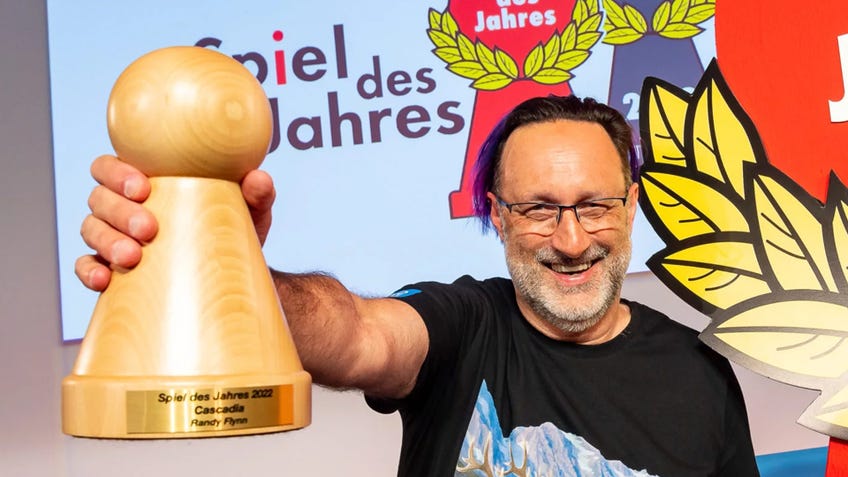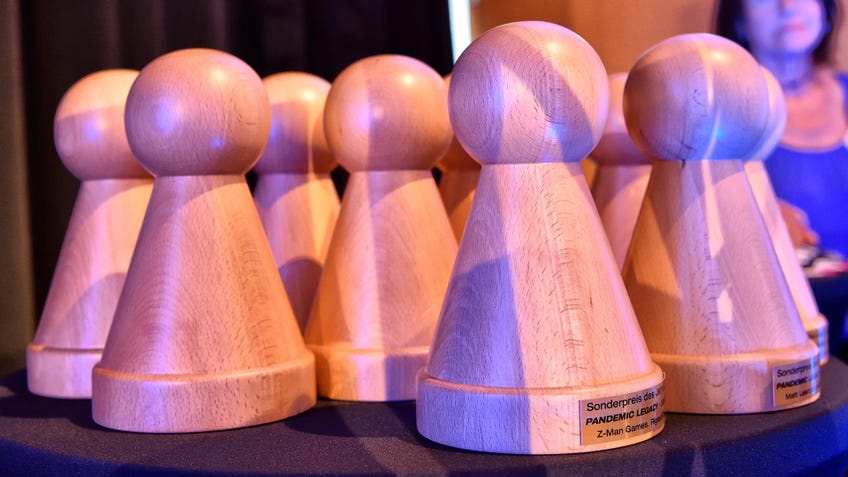The Spiel des Jahres doesn’t deserve to be board gaming’s biggest award in 2023
40-plus years on, the German prize is still the most prestigious accolade a board game can receive - despite a very spotty history of winners.
Every July, one lucky game designer wins an unexpected jackpot: one of their games is awarded the Spiel des Jahres, the most sought-after ‘Game of the Year’ prize in board gaming. It really can be a bonanza: most hobby titles sell a few thousand copies, while award nominees can shift into the tens of thousands and winners into the hundreds of thousands. That’s a colossal reward, both in financial and historical terms - even more so when you realise that it’s given by the decision of a closed jury which doesn’t have the best track record of picking classic games.
Consider: while advances in game design and changing taste have made it unfair to look at the very oldest winners, if you take a sample from between 1990 and 2010 then there are five, maybe six titles that have proved to have real staying power. For every Settlers of Catan and Carcassonne that are still on shelves, there are three others which have, fairly or unfairly, been largely forgotten. But the real surprise is that that’s just in terms of what’s still selling on the mass market. If you’re a hobby gamer, it’s even less representative.
Back in 2002 it felt like the Spiel des Jahres jury drew a line in the sand when it chose Villa Paletti for the award over Puerto Rico. This was after several years of handing the gong to slightly meatier titles than the family-friendly fare it tended to favour early on. By giving the nod to a fun, if wholly unremarkable dexterity game over one of the biggest and most popular strategy titles for years, it seemed like a point was being made: the games that win the Spiel des Jahres should be for as many people as possible, rather than for people who love games.
For every Settlers of Catan and Carcassonne that are still on shelves, there are three others which have, fairly or unfairly, been largely forgotten.
Since then, design has come on in leaps and bounds so that it’s now more common than ever to find an extraordinary amount of play value in relatively approachable games. But the jury has been unwavering. In 2012 the forgettable Kingdom Builder won, while the much heavier Terra Mystica was ignored - yet it’s the latter that’s still regularly gracing tables. 2017’s winner, Kingdomino, has fared a bit better, but it is essentially a children’s board game, and has been totally eclipsed in the hobby world by Spirit Island.
More recent winners have included Cascadia and Azul, both of which have the makings of a bona fide crossover smash. But in-between, the winners were word-guessing party game Just One, object-guessing party game Pictures and Where’s Wally? knock-off MicroMacro: Crime City. Indeed, guessing games seem to be all the rage in recent years; just look at this year’s nominee Fun Facts. Which is not to say they’re not fun, only that they’re not the kind of titles that dedicated gamers will still be slapping on their tables a decade from now. Put in context, Cascadia and Azul look like freak winners, where the jury just happened to pick up something with some hobby traction.

None of this, however it might sound, should take away from the Spiel des Jahres jury. They have a difficult and unenviable task in trying to pick out evergreen classics without any benefit of hindsight. When they do overlook really deserving titles, they give out “special awards” in later years - like the “literary game” prize given to Reiner Knizia’s Lord of the Rings, in part as a recognition of his enormous contributions to gaming not having translated into prior Spiel awards. And honouring hobby games has never been their mission: the award is about excellence in family gaming in the German market. As the popularity of the award has grown, they’ve tried to bring hobbyists into the fold with the Kennerspiel (“Connoisseur”) category, although the winners have still remained a little hit-and-miss and very much on the lighter side.
Honouring hobby games has never been the Spiel des Jahres's mission: the award is about excellence in family gaming in the German market.
Rather, the difficulty is trying to work out why, exactly, game hobbyists continue to ride the hype train for Spiel des Jahres winners and nominees after so many years, when it’s been clear that the picks are not supposed to be for us.
After all, it’s not like the gaming world is short of awards to root for. If you want a jury award, then that’s how The Dice Tower hands out its gongs. (Disclaimer: I am on that jury.) If you want an award decided by popular vote, then BoardGameGeek’s annual giveaway fits the bill. Or if you want something that’s decided by industry professionals rather than content creators, then the Origins Awards have you covered. All three have a better track record in picking evergreen titles for the hobby crowd than either the Spiel or the Kennerspiel des Jahres, yet the rosettes on the box don’t carry the same weight as the famous Pöppel, to the point where publishers don’t always even bother to feature them.
Some of this might well sound elitist, but that’s not the intention. Lots of lighter, family board games are lots of fun and deserved classics in their own right, and I don’t think it’s elitist to observe that most families simply don’t want to sit down to the ludic equivalent of a spreadsheet or a Pentagon planning exercise every night.
Rather, it’s a plea: let the Spiel des Jahres jury do what it does best, but let it be a sideshow among many such shows rather than the main event. After all, novelty is what makes many of its nominations interesting - but if you broaden your award horizons, you’ll be rewarded with the same joy of discovery many more times over. Only, this time, you might well find the picks align better with your tastes.

